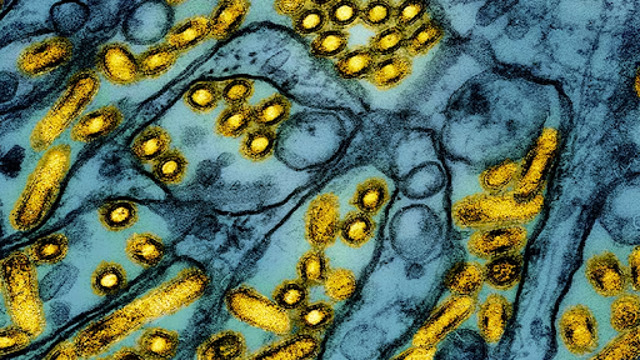
This colourized electron microscope image released by the U.S. National Institute of Allergy and Infectious Diseases shows avian influenza A H5N1 virus particles (yellow), grown in epithelial cells (blue). (CDC/NIAID/The Associated Press)
The U.S. has reported its first severe human case of bird flu, with a Louisiana resident currently in critical condition, according to the Centers for Disease Control and Prevention (CDC). Although the CDC did not initially provide details on the patient’s symptoms, the Louisiana Department of Health confirmed that the individual is suffering from severe respiratory illness. The patient, who is over 65 years old and has underlying health conditions, is considered to be at higher risk due to these factors.
On the same day, California declared a state of emergency as the H5N1 bird flu virus spreads more widely in dairy herds. Since late August, 649 herds across the state—about 60% of California’s total dairy population—have tested positive for the virus. So far this year, more than 60 bird flu infections have been reported, with over half of these cases occurring in California. In two incidents, involving an adult in Missouri and a child in California, the exact source of the infection remains unclear.
Earlier cases of bird flu in the U.S. have generally been mild and mostly involved farm workers exposed to infected poultry or dairy cows. However, the Louisiana case, confirmed by the CDC on Friday but only made public on Wednesday, marks the first U.S. human case linked to exposure to a backyard flock.
Genomic data from the virus that infected the Louisiana patient suggests it is a strain related to recent H5N1 cases in wild birds and poultry in the U.S., as well as human cases in British Columbia and Washington state. This particular strain, known as the D1.1 genotype, differs from the version found in U.S. dairy cows and other recent human cases and poultry outbreaks.
Since March, bird flu has affected over 860 dairy herds across 16 states and led to the deaths of 123 million poultry since the outbreak began in 2022. Meanwhile, British Columbia’s health authorities stated they will not provide further updates on the condition of a teenage patient who contracted bird flu unless deemed necessary for public health reasons.
Despite these developments, U.S. health officials continue to emphasize that bird flu remains primarily an animal health issue, and the risk to the general public remains low. There has been no evidence of person-to-person transmission of the virus. The CDC advises people to avoid exposure to infected birds and animals to reduce the risk of contracting the virus, noting that infected animals shed the virus through saliva, mucus, feces, and other bodily fluids, including unpasteurized milk.















